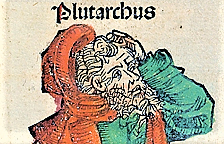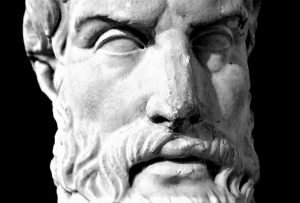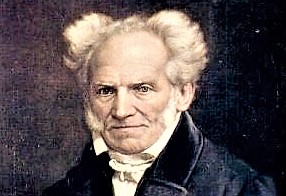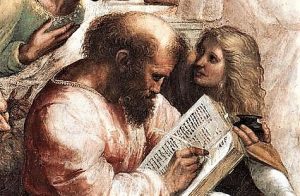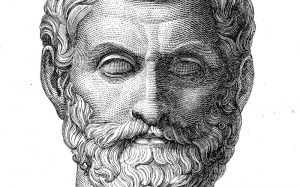Protagoras
Protagoras of Abdera was one of the many fifth-century Greek thinkers (including also Gorgias, Hippias, and Prodicus) best known as the world's oldest sophists, a group of itinerant professors or intellectuals who considered themselves to be experts in rhetoric (which was the science of oratory) and related matters. It was and is known mainly by three statements: that man is the measure of all things (which is often interpreted as a kind of radical relativism), that he could make the "worst (or weaker) argument appear better (Stronger)" and that one could not know whether or not the gods actually existed. Although some ancient sources claim that these positions led him to be judged in Athens, and his books were burned, these stories may well have been later legends. The idea of Protagoras that judgments and knowledge are somehow relative to the person who judges or knows, has been very influential and is still widely discussed in contemporary philosophy.
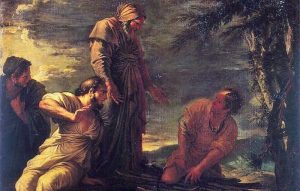
- Occupation: Sophisticated philosopher.
- Why is he famous: For being an expert in everything related to rhetoric.
Who was Protagoras?
Protagoras was an important Greek thinker during the 5th century. One of the most recognized sophists and one of the oldest too. Itinerant professor and intellectual regarded as an expert on rhetoric, and on all matters related to it.
Biography of Protagoras
According to information from ancient authors, Protagoras was a native of Abdera, although, some people thought he was native of Teos, a city located in Minor Asia. He was a faithful follower and disciple of Democritus and was also related to some Persian magicians, when King Xerxes was expelled against Greece. He also worked as a loader and invented a cushion called tyle, which made the transport of light loads easier.
He was part of the group of creators of rhetorical art and introduced erotic reasoning. He collected large sums of money from teaching and his educational commerce generated enormous incomes even larger than the famous sculptors of the time. He led a wandering life teaching in different Greek cities. His relationship with Greece had two cycles, one in which he was closely related to the powerful of the city, and the other in which he was repudiated and condemned. He apparently drowned during a trip to Sicily, when he was fleeing from impiety accusations of which he was the victim in the city of Athens (416 B.C.).
Protagoras thought
The main principle of Protagoras referred to the human being’s status when confronting the world around him. For him, man was the measure of all things. It is usually designated with the expression “Homo mensura” which means “Man is the measure of all things”, and it was a very used phase by him. For Protagoras, the sentence that was emitted had different interpretations because it was difficult to determine the individual or collective sense. He used three basic expressions: man, measure and things.
Interpretation in individual sense, showed man as a concrete being. The collective interpretation had two different approaches, one that addressed each human social group’s expression and the other that considered it from a generic point of view. He roundly criticized all the superstitions and religious rites that existed in his time, but always maintained an agnostic and skeptical stance, not necessarily atheist. Two famous dialogues of Plato, Teeteto and Protagoras, refuted the doctrines of Protagoras.
Protagoras contributions
Its influence within philosophical history has been very significant for humanity. Historically, it was in response to Protagoras and his fellow sophists that Plato began to search for forms or more knowledge that were transcendental and could somehow anchor moral judgment. It was part of a change in philosophical focus from the earlier pre-Socratic tradition of natural philosophy, to an interest in human philosophy. He emphasized the way in which human subjectivity determines how we understand, or even construct our world, a position that remains an essential part of the modern philosophical tradition.
Works
His most important works that we can rescue are: Truth and About the Gods, of which only a few small fragments are preserved. Protagoras’ doctrine has been interpreted, from Plato (who dedicated a dialogue to it, entitled Protagoras), as a relativism that would be expressed in the famous maxim that “man is the measure of all things”. He affirmed that we know not what objects are, but what they seem to us to be, in other words, not the essence but the appearance, and at the same time, he defended the conventional character of moral norms.
How to cite this article?
Briceño V., Gabriela. (2019). Protagoras. Recovered on 24 February, 2024, de Euston96: https://www.euston96.com/en/protagoras-en/



